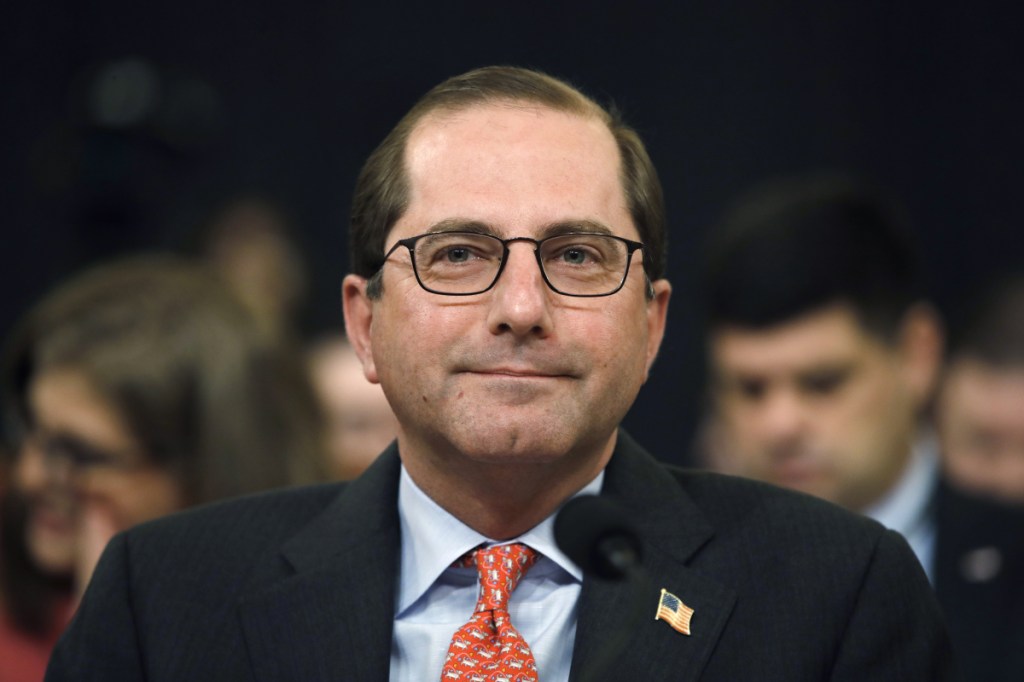WASHINGTON — The Trump administration Tuesday spelled out a plan to lower the cost of health insurance: give consumers the option of buying less coverage in exchange for reduced premiums.
The proposed regulations would expand an alternative to the comprehensive medical plans required under former President Barack Obama’s health law. Individuals could buy so-called “short-term” policies for up to 12 months. But the coverage would omit key consumer protections and offer fewer benefits, making it unattractive for older people or those with health problems.
The plans would come with a disclaimer that they don’t meet the Affordable Care Act’s safeguards, such as guaranteed coverage, ten broad classes of benefits, and limits on how much older adults have to pay. Insurers could also charge more if a consumer’s medical history discloses health problems.
Nonetheless, administration officials said they believe the short-term option will be welcomed by people who need an individual health insurance policy but don’t qualify for the ACA’s income-based subsidies.
Those in this largely middle-class crowd make too much for subsidies and have absorbed years of price hikes. Some say they now face monthly, mortgage-size payments of well over $1,000 for health insurance. Then they usually have to pay a deductible of several thousand dollars. Research indicates the uninsured rate among these customers is growing.
“If you are not subsidized, the options can be really unaffordable for folks,” Health and Human Services Secretary Alex Azar told reporters. The administration estimates monthly premiums for a short-term plan could be about than one-third of what a comprehensive policy costs.
Democrats swiftly branded it a return to “junk insurance,” and the main insurance industry lobbying group said it was concerned the Trump plan could divide the healthy from the sick in the market and make it more expensive to cover those with health problems.
Democrats say the solution is to increase government subsidies, so that more middle-class people will be eligible for taxpayer assistance to buy comprehensive coverage. The Obama administration had limited short-term plans to periods of no longer than three months, making them impractical for many consumers.
“We shouldn’t be in the business of providing people with worse care,” said Sam Berger, a former Obama aide now with the liberal Center for American Progress. “What we should be focusing on is finding ways of reducing the cost of high-quality care.”
Trump administration officials reject the notion that they’re trying to undermine the ACA. Instead, they say they are trying to make things more workable for people who are not being helped by the health law.
The administration estimates that only about 100,000 to 200,000 people will drop coverage they now have under the ACA and switch to cheaper short-term policies. They also say they expect short-term plans could attract many people among the estimated 28 million who remain uninsured.
“What we see right now is that there are healthy people sitting on the sidelines without coverage, and this is an opportunity to provide them with coverage,” said Seema Verma, head of the Centers for Medicare and Medicaid Services, which also administers the Obama-era health law.
A government economic analysis that accompanied the proposal forecast a moderate increase in premiums among customers sticking with their ACA plans through HealthCare.gov. Because subsidies are tied to the cost of premiums, taxpayers would end up spending more.
Administration officials said there’s no final decision on whether consumers will have a legal right to renew coverage under one of the new short-term plans.
One major health insurance company, United Healthcare, is already positioning itself to market short-term plans.
But others in the industry see them as a niche product for people in life transitions, like being in-between jobs, moving to another state, or retiring before Medicare kicks in.
“I certainly wouldn’t recommend them to someone receiving a significant subsidy or who has ongoing health issues, but there are certain times and certain places where it makes sense,” said Jeff Smedsrud, an insurance entrepreneur whose companies sell short-term plans.
Consumer advocates say customers should read the fine print carefully to make sure the plan will cover their expected bills.
The administration’s proposal will be open for public comment for 60 days. Plans would be on the market later this year.
However, short-term coverage won’t count as qualifying coverage under the Obama health law for 2018. That means consumers with such plans would legally be considered uninsured, putting them at risk of fines. That wouldn’t be a problem next year, when repeal of the ACA requirement that most Americans have coverage takes effect.
Tuesday’s proposal follows another administration regulation that would allow groups to offer “association” health plans also exempt from ACA requirements to small businesses and sole proprietors. Having failed to repeal “Obamacare,” Trump is now chipping away at it through regulations and waivers.
The plan doesn’t affect people with job-based coverage, still the mainstay for workers and their families.
Send questions/comments to the editors.



Comments are no longer available on this story